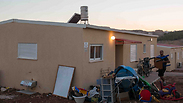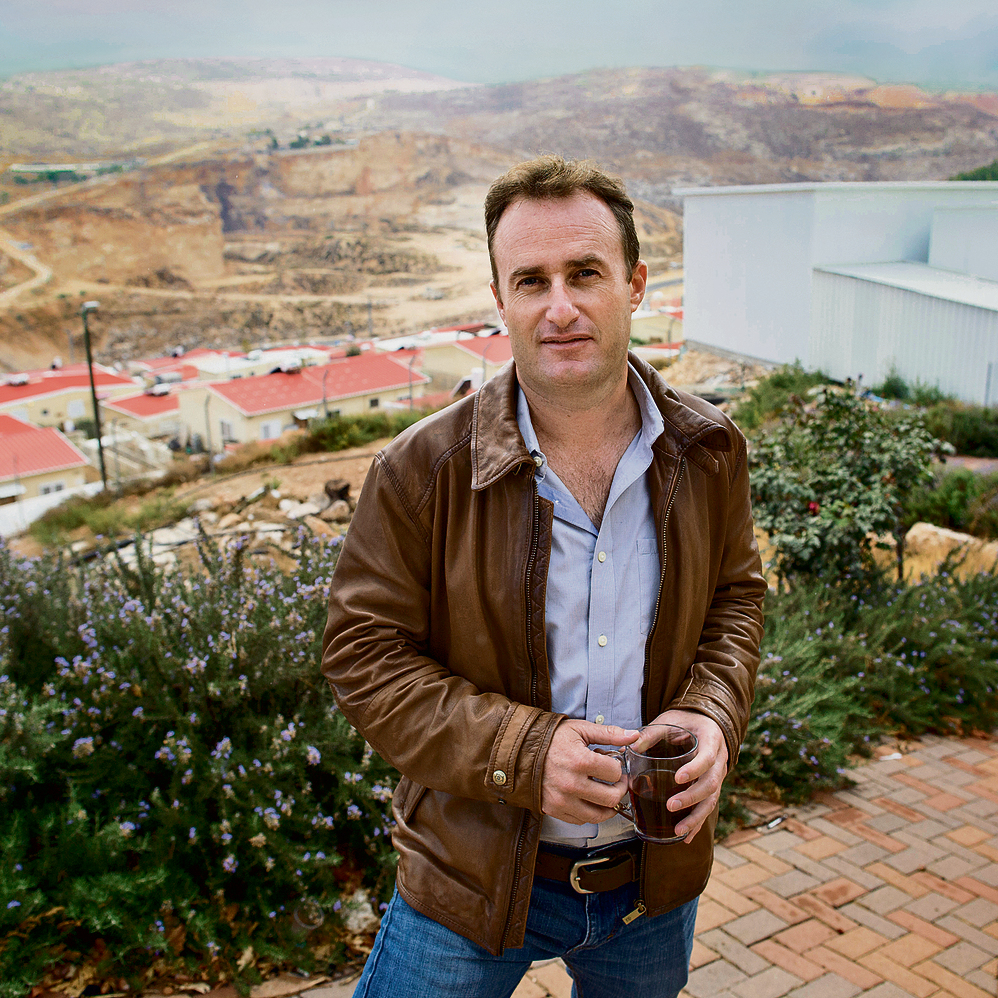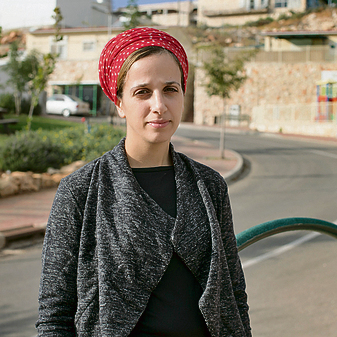

Will Migron be evacuated once again?
Four years have passed since the West Bank settlement was relocated to a nearby hill, and its residents still live in caravans despite a government decision to build them a permanent community. Meanwhile, the owner of a winery located in the same area files a lawsuit against the state, demanding that the government keep its promise to relocate the winery or, alternatively, evacuate Migron’s residents.
Four years have passed since the community of Migron was evacuated from its original location on the top of the mountain. Government Resolution 4569 from April 2016 determined that a new permanent community would be established in the lower parts of the mountain slope, at a site known as Givat Hayekev.

Four years have passed, and there is not a single sign of the beginning of permanent construction on the ground. The only permanent building rising above the caravans is the Psagot Winery. Round stone arches, glass-fronted display cabinets filled with dark bottles, carved wooden tables, a visitors’ center, a banquet hall, grass and a strong smell emanating from wooden barrels of fine sparkling wine.
The winery was there first. It was established in 2008 on an area covering 1.5 acres by Yaakov Berg. He had purchased the rights to the land from the Mateh Binyamin Trade, Planning and Development Company, which leased from the Civil Administration some 15 acres designated for tourism and industry for more than NIS 3 million. The winery and the visitors’ center are stuck like a thorn in one’s side in the middle of the area where the Israeli government decided to build the permanent community of Migron. A tourism area in the heart of a residential neighborhood creates an impossible chance for coexistence with noisy weddings into the night and babies trying to sleep.
Before Migron was relocated to Givat Hayekev, the government promised to fund the construction of another winery at an alternative site, and to turn the winery into a public building within the future permanent community of Migron. So what if it promised?
The government also promised to work to change the purpose of the land from tourism to housing. So what if it promised? In order to establish the temporary site for the evictees of Migron, a special military order was issued to temporarily alter the land’s designation from tourism to housing. The temporary order was valid for two years. It could have been extended by law by two more years, but it was not, and the four years have already passed. A plan to permanently change the zoning has yet to be submitted. This means that the temporary site of Migron, which was established by the Israeli government in order to evacuate the residents of the illegal outpost of Migron, is no longer legal.
Last week, in an unprecedented move, winery owner Yaakov Berg and the Mateh Binyamin Development Company filed a lawsuit against the Prime Minister’s Office, demanding that the government keep its promise and relocate the winery at a cost of NIS 25 million, or alternatively, evacuate the residents of Migron from the area owned by the company. That’s right, a Jew seeking to evacuate Jews.
‘Outrageous government conduct’
“We hesitated a lot before taking this step,” Berg admits. “It’s not easy filling a lawsuit against the government, and it’s definitely not easy asking to restore the land to its prior condition – in other words, to evacuate the residents of Migron again. We are trying to contribute to the state, not to take things from it. We did not demand compensation for the damage, just an implementation of a commitment enforced by documents and in countless meetings.
“The Israeli government’s conduct is outrageous. I never imagined that this is the way the state is being run. Before the Migron agreement, then-Cabinet Secretary Zvi Hauser came here, to the winery, put his hand on my shoulder and asked me to withdraw my objection to the establishment of the new Migron in Givat Hayekev. I understood that it was very important for the residents to move here of all places, in order to feel that they are not leaving the mountain.”
Hauser did not just put his hand on Berg’s shoulder. He also made sure that the winery’s relocation would be mentioned in the government’s decision to establish the temporary and permanent site of Migron, although it did not include any explicit commitment, but an instruction to “look into the possibility of relocating it to an alternative site.”
Later, in June 2012, at the conclusion of a meeting at the Prime Minister’s Office in the presence of many senior officials, the cabinet secretary pledged that “the government will fund the construction of an alternative building and the transfer of the visitors’ center and the winery to the new building according to the assessment of a government actuary and subject to legal approval.” The decision was also adopted by the Civil Administration’s planning authorities, and Berg withdrew his objection to Migron residents’ relocation to Givat Hayekev.
“Within two months, as quick as lightning, they constructed the temporary site for Migron’s residents. As soon as the High Court ruling for the evacuation was implemented, no one cared about it anymore,” says Berg. “There are more urgent matters to deal with. That’s the Israeli government’s evident message.”
It would be inaccurate to say that the government did not do anything. After a long process, a government assessor estimated that the total cost of the construction of a new building and the relocation of the winery’s internal components would be NIS 25 million.
“This sum was not determined by me,” Berg stresses. “It was determined by a government assessor. But nothing happened. Three years ago, we demanded another meeting with the cabinet secretary, who was already Avichai Mandelblit. It took him time to study the issue. Mandelblit, a jurist who measures every word that comes out of his mouth, stood up in the last meeting and said to us: ‘I’m sorry. I apologize on behalf of myself and on behalf of the Israeli government. What was done to you was wrong. This thing has been going on for three years. I’m saying this to you on behalf of myself and on behalf of the prime minister. All you did was provide the ground. You helped us when we needed it.”
Mandelblit explained in the meeting that he had solved the legal issue, and that all that was left was to bring the money, which he would finalize with the director-general of the Prime Minister’s Office. What legal issue did Mandelblit rush to solve?
It turns out that in June 2014, the Legal Department at the Prime Minister’s Office issued a long letter to Mandelblit, which stated that the agreements signed by Hauser were unauthorized. Mandelblit, as cabinet secretary, claimed he had managed to solve the legal problem. “But after Mandelblit’s apology, we never heard anything else from him,” Berg says. “We remained in touch with representatives of the Prime Minister’s Office, with Avi Cohen, who was tightly connected to the office’s previous director-general, Harel Locker.”
With no other choice, Berg and the trade company turned to the legal channel. A long letter of warning before instituting legal proceedings, backed with evidence, was sent by Harel Arnon to the director-general of the Prime Minister’s Office. The letter of response, signed by the office’s legal advisor, Shlomit Barnea-Farrago, claimed that “the government did not authorize anyone to make a commitment on its behalf.”
“It’s crazy,” Berg smiles, managing to keep the composure of a businessman. “We worked vis-à-vis the most senior officials. Was I supposed to ask Bibi (Prime Minister Benjamin Netanyahu) himself to attend all the meetings? To sign the protocols? I can’t wait to see the government’s statement of defense to our claim. No problem, we’ll put Hauser and Mandelblit on the witness stand. If Hauser and Mandelblit acted without any authority as cabinet secretaries, then the current attorney general, Mr. Mandelblit, should file a lawsuit against Hauser and against himself for exceeding the limits of their authority.
“I can’t understand what’s going on here. Migron’s residents were moved from their original location because of a nonexistent Arab land claim. The District Court has yet to find a single Arab capable of proving that the land at the top of the mountain is his. The High Court ruled in favor of Migron’s evacuation not because of any proof that the land belongs to Palestinians, but simply because of the lack of planning feasibility. Now Migron’s residents have again settled illegally, this time on land which belongs to the trade company and to me. So because I’m a Jew, it makes it okay? If the Israeli government is unable to meet its commitment, it should restore the situation to its prior condition, take the people sitting here and move them somewhere else.”
Despite his resolution, Berg the settler very much hopes that the demand made by Berg the businessman will not be implemented. He doesn’t want another Migron evacuation on his conscience. That is probably also the last thing the conflicted government needs right now. If Netanyahu is currently suffering from a light to mild headache caused by the attempt to reach an agreement on the evacuation of the illegal outpost of Amona, he is now in for a serious migraine concerning Migron. What are his chances of reaching an agreement with Amona’s residents, if the Migron agreement has not been honored?
“I would definitely suggest that Amona’s residents be very careful when it comes to agreements with the government,” Berg says. “We have everything in documents, yet four years later nothing has happened. They should be very careful and know that the Israeli government is reluctant to honor agreements. High Court rulings are implemented on the set date. Government decisions can be postponed or not be implemented at all. That just goes to show who is the real sovereign in the State of Israel today.”
‘We no longer believe anyone’
Elisheva Razvag, a dancer and dance teacher and mother of four, has been living in Migron for six and a half years. Her family arrived at the mountain even before the threat of evacuation, and today they live in a caravan in the temporary site.
“I feel deceived,” she says. “When we were evacuated last time, there was a sort of comfort, that they would build us a new and regulated community. Today we’re at a much lower place. Physically, we are sitting at the foot of the mountain in a transit camp on a very small area, and legally, the temporary site we live in, which was established by the Israeli government, is no longer legal today. There have been so many unfulfilled promises that we no longer believe anyone. How long can we live in such impermanence and uncertainty regarding the future? There are families with eight children here, people who want to settle. We are earth people. We want to feel the earth, not to live in the density of a transit camp.”
Out of the 50 families evacuated from Migron, 10 have left the temporary site. Most of them are veteran families who were the pioneering force in Migron’s establishment. They were replaced by 10 younger families. “I understand those who decided to leave,” Razvag says. “The reality we have found ourselves in is very complicated. The families that remain understand that in these tough times there is no choice but to follow ideals.”
What do you have to say about the lawsuit filed by your neighbor from upstairs?
“I heard about the lawsuit. They sent an email to the residents and updated us. I understand the winery owner. There is something good about this lawsuit. Anything that makes noise and makes it clear to the government that it can’t keep throwing us around is welcomed, as far as I’m concerned. On the personal level, the moment I heard about the lawsuit, the first thing I wanted to do was to go back to our original place, which we miss. There are voices in the community which think that is what needs to be done, after four years in which the permanent construction has yet to begin.”
You may be evacuated again following the lawsuit.
“This possibility hasn’t even crossed my mind, because the absurdity of something like that happening is unreal. Another evacuation of Migron is a wild exaggeration. It won’t happen easily. Even the most moderate residents of the community, those who spoke about the need to reach agreements with the government and prevent a forced evacuation, have already lost their innocence and are beginning to think differently. We will establish a permanent community on this mountain, and I believe that we will return to the top of the mountain, to Migron’s original location, in the future.”
Some may claim that the entire government decision is irrational. You established a community illegally and you forced the government to fund the infrastructure for a permanent community.
“The original Migron was established by the state. There is no individual who can establish a community on his own. Migron already had zoning regulations which had to be finalized. For the Bedouins in the Negev, the government not only builds infrastructure for new communities, it also gives them very generous compensation packages. We didn’t force anything on the government. A decision was made, and government decisions much be honored, period.”
The Prime Minister’s Office offered the following response: “The Legal Department received the lawsuit and will respond to the court.” Former Cabinet Secretary Zvi Hauser refused to be interviewed or comment on the claims.
















